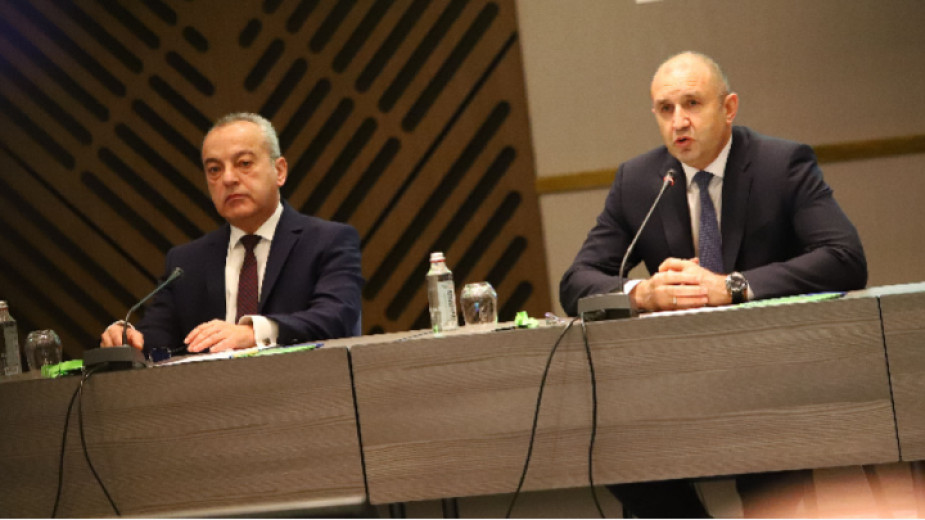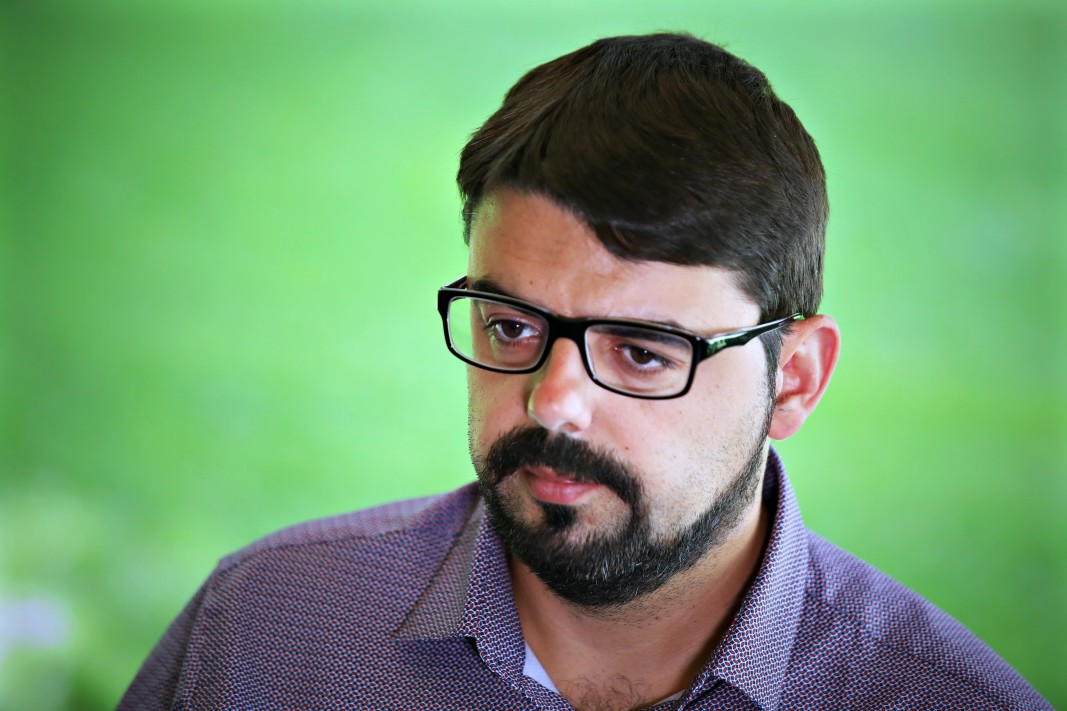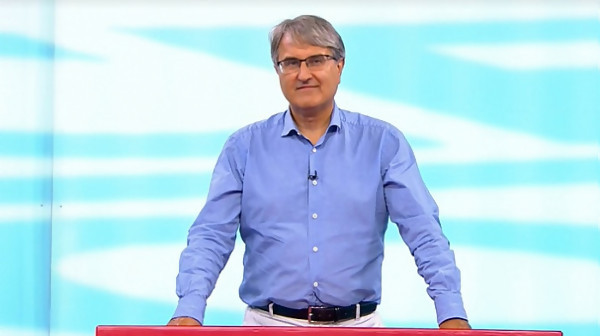
In the midst of an energy crisis, Bulgaria does not have an approved strategy for the development of the energy industry, said Prime Minister Galab Donev at the opening of a round table on the development of the energy industry for the period 2023-2053. His words came in response to the question: Why is a caretaker government drafting such a long-term document?
Galab Donev went on to remind the attendees that last week the National Assembly voted to obligate the caretaker government to renegotiate, with the European Commission, the section of Bulgaria’s Recovery and Resilience Plan pertaining to energy.
“Renegotiating the national Recovery and Resilience Plan is, in effect inconceivable without a strategic vision for the development of the electric energy sector over the next at least 30 years. A top priority in drafting the strategy is to guarantee energy and national security, and to maintain Bulgaria’s leading role as net exporter of electric energy and balancing factor for the region,” PM Donev said.
The strategy, which is yet to be adopted by the Council of Ministers, envisages the construction of 2,000 MW of nuclear power capacities at the construction site of the defunct project for a second nuclear power plant at Belene. Plus another 2,000 MW for replacing reactors 5 and 6 of the existing Kozloduy NPP.
“Bulgaria cannot afford to waste any more time, whether there is a caretaker or a regular government, and it is the responsibility of us all to sit down together and think about the future of the country,” President Rumen Radev on his part stated in his opening address at the round table.
Martin Vladimirov: It will turn the clock back 25 years in the development of the energy sector

“The so-called vision of the caretaker government spanning the period until 2053 demonstrates an attempt to preserve the oligarchic model of corruption in the management of the Bulgarian energy industry,” said Martin Vladimirov, Director of the Energy and Climate Program of the Centre for the Study of Democracy in an interview with the BNR’s Horizont channel. “It locks the country inside a continuing dependency on the base capacities of coal and another 4 gigantic projects for the construction of nuclear reactors, utterly lacking in any economic or regulatory logic. Instead of moving forward and bringing Bulgaria’s energy industry in line with Europe’s policies of moving away from Russian energy and the dependence on fossil fuels, we are turning the clock back 25 years in the development of the energy sector and repeating the same mistakes. Unrealistic apocalyptic scenarios for the future of Bulgaria’s electric energy and the closure of coal-fired power plants are being paraded,” Martin Vladimirov said, and added that the wrong impression is being created that without coal-fired plants we shall be left in the cold and dark:
“It leaves a bitter impression that the aim of the vision is political, that it is an attack on the political opponents of the caretaker government instead of a way to attain real reform in Bulgaria’s energy sector.”
“When Bulgaria makes its long-term strategy in the energy industry official, it will be much more difficult for the European Commission to argue against the arguments this country will present in favour of renegotiating the Recovery and Resilience Plan and of altering the commitments assumed,” Martin Vladimirov explained and added that the EC was very clear the Recovery and Resilience Plan can only be changed in exceptional cases which would require a rigorous case-by-case assessment, adding that he believes Bulgaria will not be able to argue the case.
Evgeni Kanev: We cannot keep pushing for the construction of Belene NPP, in one form or another, for 30 whole years

“Bulgaria does not need such massive energy generating capacities. that is an old idea – when a lobby, connected with nuclear power generation enters the country’s corridors of power they start dreaming of huge capacities,” says macroeconomist Evgeni Kanev in an interview with the BNR’s Horizont channel. “There are new realities in the world, in energy, in the demographic structure of the population, in the tendencies. We cannot keep pushing for the construction of Belene NPP, in one form or another, for 30 whole years. The population of Bulgaria is decreasing, yet we are the biggest exporter of electricity in Europe,” Evgeni Kanev says and adds that he is not opposed to nuclear energy, but that: “We cannot, as someone has said, be a nuclear factor. That is ridiculous because by building nuclear capacities Bulgaria is, in point of fact, becoming more dependent, not less – with regard to the import of technologies and maintenance, with regard to the nuclear waste it is dependent on the supplier. We are moving towards renewable energy, and that is a fact.”
Evgeni Kanev adds further that even if the European Commission agrees to a renegotiation of the country’s Recovery and Resilience Plan, Bulgaria stands to lose a lot of money and miss many opportunities for reform. “There seems to be some kind of tacit agreement against any reforms in Bulgaria, and a large part of the economy is functioning in 20th century conditions and is applying 20th century methods and. It is high time reformers came forward who will have the interests of all people in the country at heart, not just of the lobbies.”
According to the macroeconomist, the oil derogation actually benefits Lukoil, not consumers in Bulgaria, because “we are paying European prices for the processed oil we are buying at petrol stations”.
“We shall wait and see whether the promise of huge budget revenues will be kept. I very much doubt it,” he said.
Interviews by Horizont channel, BNR
Compiled, edited and translated from Bulgarian by Milena Daynova
Photos: BGNES, Nova TV
One of the largest cargo ships in the world docked for the first time at the Port of Varna, delivering 58,000 tons of rapeseed, BGNES reported. The shipment arrived from Canada and will be refined in Bulgaria. The delivery was made due to a..
Fitch Ratings has affirmed Bulgaria's Long-Term Foreign-Currency Issuer Default Rating (IDR) at 'BBB' with a Positive Outlook, reported BTA. ''Bulgaria's ratings are supported by its strong external and public finance balance sheets versus..
There are no plans for the privatization of the Vazovski Machine-Building Plants (VMZ) in Sopot, and the information circulating in this regard is speculative, said Bulgaria’s Minister of Economy and Industry Petar Dilov at a working meeting..

+359 2 9336 661
